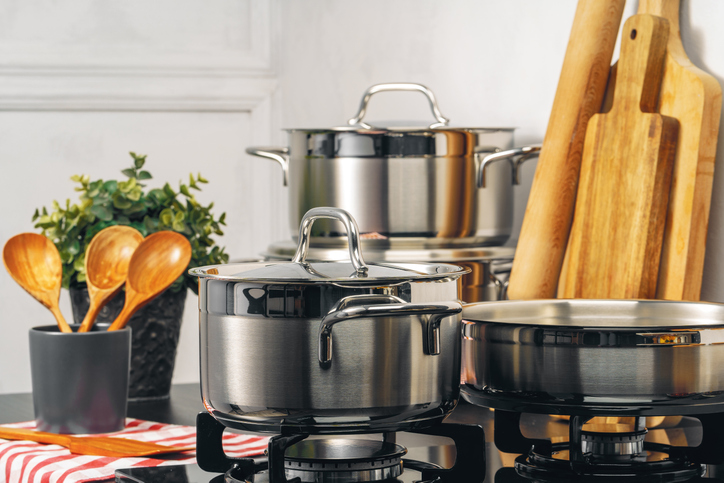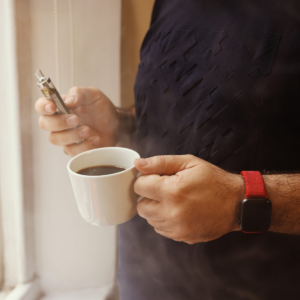The list of kitchen essentials seems pretty long but often, we’ve already got a fair few covered. Before you buy new, it’s worth asking around to see if anyone has unused bits lurking in the depths of their cupboards. Trust us, they’ll be only too happy to pass them on to you. Failing that, pop a listing on freecycle or local reuse groups you can often find on Facebook, requesting kitchen items or visit local charity shops for some real bargains.
What you need
- Knives. You’ll need at least one good quality, sharp knife to chop and slice with. Start with a paring knife or chef’s knife as they’re great all-rounders.
- Non-stick frying pan. This can double up as a wok to stir fry too.
- Saucepans. At least two heavy based or non-stick saucepans, whatever your preference. One large and one small/medium.
- Non-stick baking sheet/tray.
- Mixing bowl. Pyrex glass ones are great, a nest of 3 is even better.
- Measuring jug.
- Colander.
- Chopping boards. Glass ones are hygienic. Get two different colours/patterns and use one for raw meat preparation.
- Utensils. A few wooden spoons, fish slice (a flip food overer), potato masher, vegetable peeler,
Nice to have (and how to make-do until then)
- Reusable food storage containers – store food in bowls using plates as lids.
- Measuring cups – do your best with teaspoons and your judgement.
- Spatula – scrape out dishes as best you can.
- Box grater – chop food finely or use the vegetable peeler to make strips and ribbons or veg or cheese.
- Stick blender – use potato masher to smooth textures.
- Slow cooker – low and slow in the oven gives the same effect but uses more energy.
- Casserole dish. A temporary solution is to use a baking tray or Pyrex bowl with a tin-foil lid.
Herbs, spices and condiments
You can build your collection gradually but it’s good to have a few staples in the cupboard to add depth and flavour to food.
- Chili powder/flakes
- Cinnamon
- Garlic powder
- Ginger – you can buy frozen ginger as well as powdered.
- Oregano
- Turmeric
- Mustard
- Vinegar
- Ketchup
- Low-cal salad dressing
If you’ve got these in store, you can always rustle up a meal:
Cupboard basics
- Olive oil – a spray bottle will help reduce the quantity you use.
- Porridge oats
- Tinned tomatoes
- Tinned pulses
- Tinned fish, tuna, salmon, sardines
- Tinned fruit in juice
- Reduced fat coconut milk
- Brown pasta and rice
- Quinoa
- Nuts and seeds
- Onions
Fridge
- Milk/milk alternative
- Low-fat yoghurt
- Eggs
Freezer
- Peas
- Bread
- Mixed veg
- Frozen berries
Other bits
- Kitchen roll – handy to blot away excess fat as well as wipe up spills and use as napkins.
- Paper bags – perfect for popping snacks or sandwiches in to take on trips out
- Washing up liquid, cloth/sponge and tea towels – all help to keep our kitchen spic and span.
Cooking is a skill and learning to do it well takes time. Start simple and enjoy the journey. It’s incredible that you’re making changes to your lifestyle to support your long term health and wellbeing. Be kind to yourself and try not to have unrealistic expectations in terms of the meals you can produce. Pop the radio on, practice good food hygiene and cook up a storm.




